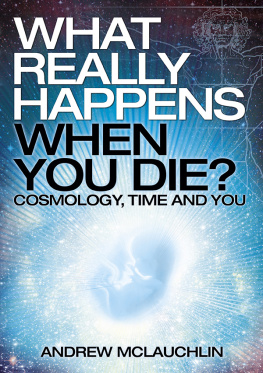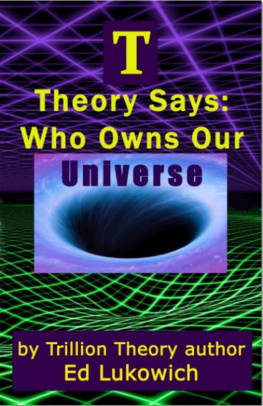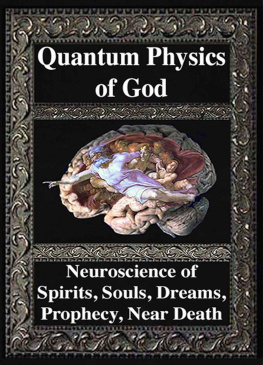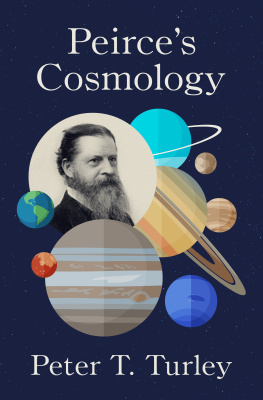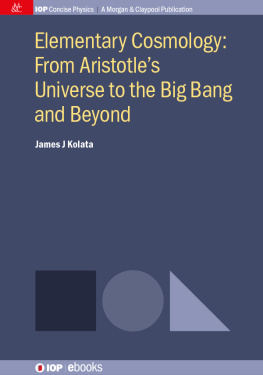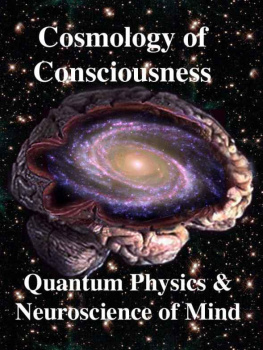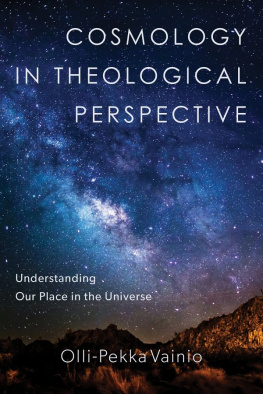
What Really Happens When You Die?
Cosmology, Time and You
Andrew McLauchlin

Behind it all
Is surely an idea so simple,
So beautiful,
So compelling that when
In a decade, a century
Or a millennium
We grasp it,
We will all say to each other,
How could it have been otherwise?
How could we have been so stupid for so long?
John Wheeler, Theoretical Physicist (19112008)
Introduction
I dont believe in astrology. Im a Sagittarian and were sceptics.
Arthur C. Clarke
The biggest mystery in life is surely what happens to us when we die.
You may question the basis of astrology, but your fate may still lie in the stars or, more correctly, the universe, because you are part of the universe and so your fate is inexorably linked to its future. You may think that you will be dead and gone long before the fate of the universe could have any relevance to you, but you would be wrong, for the fate of the universe actually explains what happens to you when you die.
Ask a number of people what happens when they die and their answers will probably fall into three groups. One group will say they have no idea; another will say that there is some form of afterlife in some form of heaven; and the third will say grimly that youre dead and thats the end, ashes and zilch. All these people will doubtless have one thing in common, however they are not enamoured of the prospect of dying.
When, many years ago, my children asked me that question, I wanted to offer them a rational explanation that might allay their fears. The question had certainly haunted me when I was very young. I remember lying in bed thinking about the distant future and wondering what happened to everything but especially, of course, me eventually. As I considered possibilities, one question kept coming to me: And then what? I couldnt think of an answer and, indeed, found the question very disturbing. So much so that I tried not to think about it again.
So, when the subject of death came up with my own children, I asked, What was it like before you were born? Was it strange? Was it horrible? No, they said, it was nothing. That, I told them, is what it must be like when you die. Nothing. Not simply nothing to worry about. An absolute nothing. Neither life nor time. So, in a way, we have all experienced death already. They seemed quite satisfied with that, and, I think, quite content, because they never asked again and have never showed any anxiety about death.
Whatever else may be theorized about death, there can be little doubt that that simple answer represents the bottom line explanation. Its an answer that makes sense and is difficult to argue with.
But more can now be said. If I were asked that question today I would be able to give a rather different answer, thanks to cosmology.
Cosmology is the science of the history and future of the universe. The big question it addresses is what happens to the universe eventually. In toiling to find the answer, some of the greatest minds in the field of cosmology, including Stephen Hawking, celebrated author of A Brief History of Time, have revealed profound implications, not only for the future of the universe and the nature of time, but also for the ultimate future of humanity, for you and me, because the future of humanity is hitched to the future of the universe. Their work reveals how cosmology does indeed hold the key to that most profound question of all what happens to us when we die? But it hasnt been revealed in a blaze of glory. It has had to be teased out, although at least one cosmologist has clearly thought about it. In a 2001 television programme, The Extreme Universe, pondering over the significance of an infinite universe, cosmologist Paul Davies said:
If the universe is infinite in spatial extent and uniform, then it is absolutely certain that there will exist other beings identical to you and me. It is one hundred percent certain that the entire inhabitants of the earth will be repeated, with duplicate Paul Davies (1)
What we find is laid out in the main theme of this book: that the dimension of time is circular, not linear. Cosmology, like religion, offers the possibility, indeed the probability, that your death is not the end of you but, unlike religion, it provides an answer that is distinctly earthly: the history of the universe is destined to be repeated, in precise detail, indefinitely and, since our lives are part of that history, we are all also destined to repeat our lives in exactly the same way. When we die we are effectively instantly transported forward to our birth in the next cycle of the universe. When we die we simply awake in our mothers arms, just as we did in this life when we were born.
The idea of circularity or cyclicity is not new. The 19th-century philosopher Frederich Nietzsche proposed a similar notion, and a number of world religions also embrace the idea, usually involving some sort of reincarnation. But none of these is a scientific theory. In cosmology there have indeed been a number of attempts to put cyclicity on a scientific footing, but all these have been in terms of cycles of the universe along a linear dimension of time. Cosmology, though often criticized for its plethora of theories, is still subject to the discipline of science and the need for evidence. What is significant here is that by adhering to that discipline we are led to a legitimate, evidenced, scientific conclusion about the dimension of time and our future.
This book follows the paths of discovery marked out by the most influential cosmologists from Einstein, via Hawking, to the present day. It explains how, from its birth in a Big Bang, the universe is expanding, and that there are just two possibilities for its future; it will eventually collapse into a Big Crunch or it will expand forever. As we work our way through the ebb and flow of evidence and theory, we see how, whilst one of these theories emerges as the most simple and elegant explanation of our fate described above, the other, albeit more circuitously, arrives at the same conclusion. This is a persuasive indication that the conclusion is correct.
Along the way we also gather insights into some of the most important fields of science Einsteins relativity theory, the nature of time, the mysteries of quantum theory, the thorny questions of consciousness what makes you you and also free will. We examine Stephen Hawkings controversial imaginary time, including the way in which it offers an intriguing idea not only about whether parallel multiverses might exist but also where. In A Brief History of Time, Hawking said that the ultimate aim of science is to achieve a complete understanding of the events around us, and of our own existence (2). Neither his book nor subsequent research claims to have accomplished that but this book trawls through the intriguing research to expose a previously unrecognized shortcut to those two most important elements of that understanding what happens to us and to time itself.
We see how the theory of relativity leads to those two possibilities that the universe will either collapse into a Big Crunch under the effect of the gravitational pull of all the matter in it a closed universe or it will expand forever an open universe.
In the first, Big Crunch, scenario it has been shown that all the positive matterenergy produced in the Big Bang could have been produced out of absolutely nothing by creating an equal and opposite amount of negative gravitational energy, so that throughout the life of the universe the total amount of energy is actually zero. This means that when the whole of the universe collapses into a Big Crunch, it simply disappears to nothing again, neither matterenergy nor space. We see how Stephen Hawking constructed his no-boundary model of the universe from this and from quantum gravity, introducing the concept of imaginary time as a circular dimension within which the history of the universe, from Big Bang to Big Crunch, is confined. We see how his model gives the first indications of a fundamental circularity to time but also that it can be modified by recognizing, by the Principle of Identity, that the Big Bang and Big Crunch must be considered as one and the same point in spacetime because there is nothing to distinguish the nothing of the Big Crunch from the nothing of the Big Bang. This principle comes from the 16th century philosopher Wilhelm Leibnizs Identity of Discernibles, which states that no two distinct things exactly resemble one another. The corollary of this is the Principle of Identity, which states;
Next page
